No one wants to get sick
And the best way to avoid coming down with a cold virus is by taking some simple precautions. You may already follow some of the expert advice that follows, but there are always extra steps to gain you extra precaution.

Wash your hands the right way
The number one way to stay germ-free? Become a serial hand-washer. “It is important to wash hands regularly with soap and water,” especially before eating or preparing food and after caring for a sick person, says Jennifer Caudle, DO, a family physician and associate professor in the department of family medicine at Rowan University School of Osteopathic Medicine in Stratford, New Jersey. But it’s not enough to do a quick rinse: To get rid of microbes that can make you sick, the Centers for Disease Control and Prevention (CDC) recommends scrubbing your hands—including the backs and in between your fingers—for 20 seconds (the time it takes to sing “Happy Birthday” twice), rinse, and dry well. Learn what can happen if you don’t wash your hands.

Change your greeting
If you don’t want to have to switch your email greeting to an automatic “out of the office due to sickness” reply, change up your in-person greeting instead. “Hands are a common way that viruses and bacteria are spread, so avoiding shaking hands can be a good strategy for prevention of colds and flu,” says Dr. Caudle. How can you do this without looking like a germaphobe? “There are many ways to greet others if you choose to avoid shaking hands: a wave, fist-bump, or even a peace sign are great ways to do this,” Dr. Caudle suggests. If you do get sick, these are things you can do to make a cold less miserable.

Don’t stay up late
You might be tempted to watch just one more episode of that binge-worthy Netflix show, but resist the urge and head to bed to keep your immune system strong. “Chronic sleep loss decreases your immune system’s production of cytokines, which are necessary to fight infection and inflammation,” says sleep expert Richard Shane, PhD, creator of the Sleep Easy method. “Conversely, when you sleep well, your immune system produces more cytokines that help your body resist colds, flu, and infections.” Studies, including one published in 2015 in the journal Sleep, have shown that sleep-deprived people who are exposed to the common cold virus are more likely to get sick. Here are more ways you’re unknowingly sabotaging your immune system.

Regulate your sleep cycle
Sleep hygiene, which can help keep you healthy, isn’t just about the quantity of sleep—it’s about the quality, too. As much as possible, keep your sleep/wake cycle the same every day to maintain your circadian rhythms. “Having your bedtime and wake time be fairly consistent can help you sleep better, which can help you stay healthy,” Dr. Shane says. Keep your room dark and cool, forego electronic devices before bed, and waken gradually with a room-brightening alarm clock. Read more about what your sleep could be saying about your health.
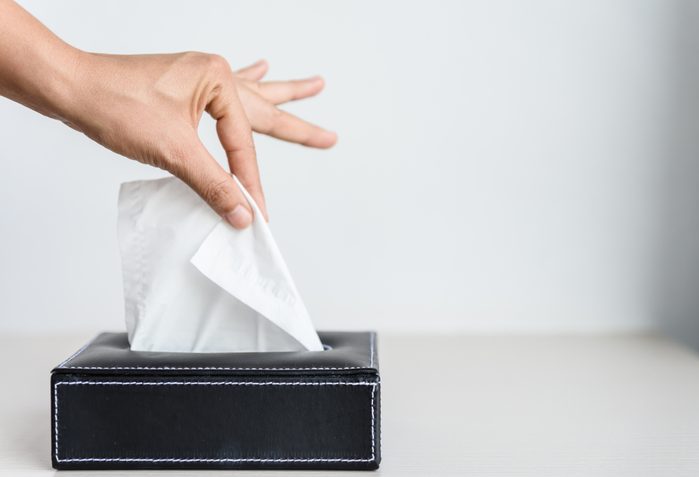
Protect your hands with a tissue
You used to be told to cover your nose and mouth when you sneeze or cough, but now the advice is a little more specific. “Covering your mouth is still very important, but it is more important to think about how you cover your mouth,” Dr. Caudle says. “Covering your mouth with your hand could end up exposing your hands to germs, and these germs could then be spread if you touch objects or other people. So, use a tissue to cover your mouth and nose.” Here are more habits doctors use to avoid colds and flu.
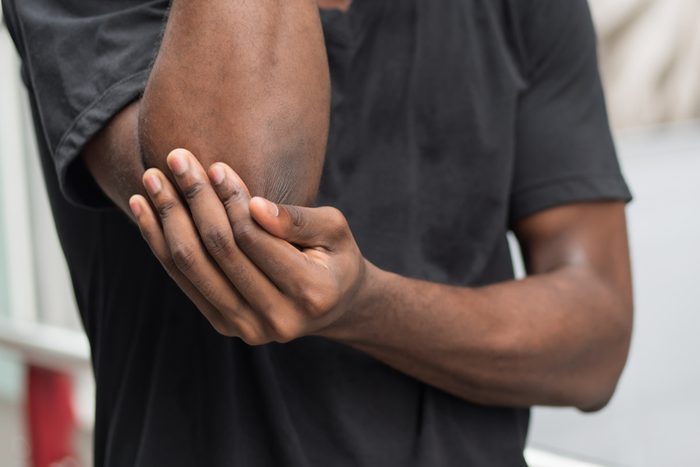
Or, use your elbow
If you don’t have a tissue, don’t use your hands to cover your mouth, suggests the CDC. “One of the best ways to cover your mouth is to cough or sneeze into your elbow,” Dr. Caudle says. “This technique allows you to prevent the spread of viruses and bacteria into the air, but also prevents you from getting viruses and bacteria on your hands which could allow them to be spread with touch.” Although this actually protects others from catching a cold rather than yourself, we’d all be less likely to get sick if everyone did it. Read about more things you didn’t know about the common cold.

Don’t touch public surfaces
You can’t live in a bubble, but you can take certain measures to prevent exposure to public surfaces that harbor germs. “Our hands can be covered in germs from others based on everyday interactions with our environment, such as opening doors in public or using shared resources at work, and our hands serve as transportation for these germs to hop between people,” says J.D. Zipkin, MD, associate medical director of Northwell Health—GoHealth Urgent Care in New York. What can you do? “Consider pushing an elevator button with a knuckle instead of a fingertip, and look for opportunities to open swinging doors with a foot, elbow, or shoulder,” says Dr. Zipkin. In general, if you can avoid touching something with your hands, do it.

Your pen is mightier
Even in the digital age, think about how many times you have to use a shared pen to sign forms or papers while out in public. “There is a balance when it comes to coming in contact with public surfaces—the key is to be mindful of your environment instead of avoiding it altogether,” Dr. Zipkin says. An easy way to do this? Borrow this tip from the National Education Association: Carry your own pen and pencil so you don’t have to borrow one. Here are things you shouldn’t touch at all-you-can-eat buffets.

Don’t touch your face
The reason germs on your hands are so dangerous is because chances are, at some point, they will end up on your face. “Our eyes, nose, and mouth are vulnerable to attack from many common cold viruses and influenza,” says Dr. Zipkin. “Unfortunately in the winter, cold temperatures can cause mild runny noses, which can increase the chance that we touch our faces.” Even with all the hand-washing you’re doing, take extra precautions by not biting nails or even picking your nose! But beware, face-touching is hard to avoid. “It is natural for all of us to touch our faces frequently throughout the day, whether we are rubbing our eyes, have an itch, eating, or moving our hair,” Dr. Zipkin says. “As a physician, it has taken me years to train my hands to avoid touching my face while I’m at work.” Find out more parts of your body you should never touch.

Sanitize
Although hand-washing remains the gold standard for removing germs you’ve picked up from your hands, an alcohol-based hand sanitizer is a close second. Make it sure it contains at least 60 percent alcohol, advises the CDC, and don’t wipe it off before it’s dried. Whatever cleansing method is available, “it is important to wash your hands with soap and warm water or a hand sanitizer after coming in contact with shared public surfaces, especially before eating,” Dr. Zipkin says.

Exercise
Among the many reasons to exercise regularly (at least 150 minutes a week of moderate-intensity physical activity such as walking or biking) is that it gives your body an immune boost. Research has consistently shown that getting a move on is linked with fewer colds—a review of studies published in 2019 in the Journal of Sport and Health Science shows the benefits of exercise on the body’s defense system. “White blood cells, which help to fight against infection, can increase and circulate more rapidly with exercise, which may offer another layer of protection against infection,” says fitness expert and registered dietitian Erin Palinski-Wade, RD, a registered dietitian and author of the 2 Day Diabetes Diet. Find out more health benefits of exercise, other than weight loss.

But don’t exercise too hard
You don’t want to overdo it when it comes to exercise, because that may actually weaken your body’s defenses against colds. “Extreme exercise can cause an elevation in stress hormones and may potentially decrease resistance against infection,” Palinski-Wade says. Respect your body’s limits, and be sure to build in recovery days if you are training for an endurance sport such as a marathon. Then, watch out for these crazy common cold symptoms you probably didn’t know about.

Get rid of germs at the gym
Speaking of exercise, if you go to a gym to work out you may be exposing yourself to all kinds of nasty bugs, suggests a study published in 2014 in the International Journal of Environmental Research and Public Health found. Especially during cold season, take measures to protect yourself by practicing good gym hygiene. “Bring your own towel and practice wiping down all equipment before using it,” Palinski-Wade says. “Wash your hands directly after exercise, and make it a practice to change after your workout into clean clothes to lessen your potential exposure to viruses and bacteria.” And if you’re feeling under the weather, stay home to avoid spreading germs to others at the gym as well. Here are more ways not to be that annoying sick person at the gym.

Avoid the crowds
You might be tempted to rush out for early morning Black Friday shopping, but consider waiting for Cyber Monday instead. Crowded indoor areas are one of the main reasons we get sick in the winter when most people don’t want to be outside in the cold. “The increase in upper respiratory infections during the fall and winter months was likely attributable to the fact that we tend to stay indoors more often during that time, which put us in close contact with sick individuals both directly, and also via recirculated air and [germ-carrying objects] around the house and office,” says Albert Ahn, MD, an internal medicine specialist at NYU Langone Trinity Center in New York. That sounds like a good reason to wear a face mask.

Go outside, but wear a scarf
If you’re looking to avoid the germy gym or the crowded mall, there’s no reason to avoid going outside when it’s cold—although take protection against an old wive’s tale that may actually have some truth to it. A study published in 2016 in the Journal of Clinical Virology shows that rhinoviruses, one of the most common causes of the cold, are spread more easily in cold temperatures. These germs also replicate best in the body when you’re just below your normal temp of 98.6, says Dr. Ahn. “This doesn’t mean one should avoid going outside during this time, but covering the mouth and nose and keeping them warm may help prevent a cold.” In other words, go outside, but bundle up. Read more on the proof you’re more likely to catch a cold in cold weather.
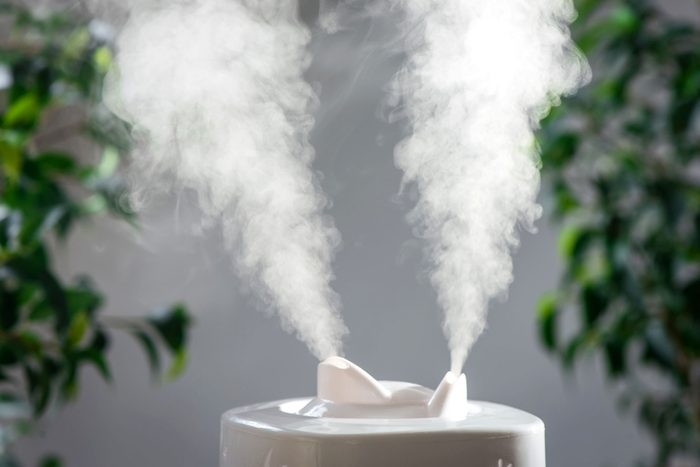
Moisturize dry air
Because dry winter air may have something to do with how easily we get sick, up the moisture level of indoor air with a humidifier. A review of studies published in 2018 in the International Journal of Hygiene and Environmental Health suggests that humidifying air can help prevent illness. “Healthy mucous membranes are naturally moist and hydrated and help act as an initial barrier to pathogens,” says Dr. Ahn. “Cold, wintry air can lead to drying out of these membranes and increase the likelihood of infection.” Also, although it can be tempting to turn up the heat, that doesn’t actually add any moisture to the air, so keep your home comfortable but not too hot.

Keep your nasal passages healthy
In addition, you can add moisture to your nose itself. Dry air “causes small cracks or breaks in this [mucous membrane] barrier, allowing the viruses to more easily invade the body,” Dr. Ahn says. “This can be prevented by using nasal saline drops to re-hydrate the nasal passages.” Here are more home remedies for head colds that are always worth trying.
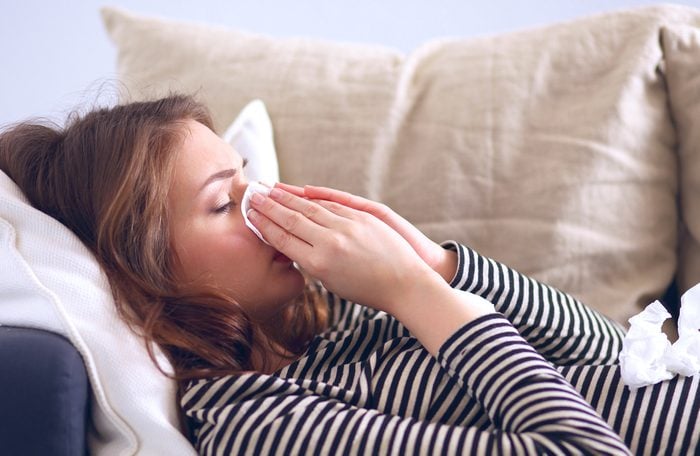
Don’t reuse tissues
We get it: You only blew your nose a little, and there’s so much tissue left. You’re trying to save trees, right? Unfortunately for the environment, it’s best not to leave your dirty tissues lying around, even if you think you can reuse them later. “Throw them away!” says Dr. Caudle, a sentiment echoed by the CDC. While they might not reinfect you (you can only get sick from the same virus once), they can make others in your home or office sick—and you wouldn’t want to catch a cold by exposure to someone else’s dirty tissues, right? To be more environmentally friendly, try switching to bamboo tissue, as bamboo is fast-growing and more sustainable.

Stand back
Beware of close talkers and anyone who’s coughing or sneezing—droplets from mucus can spread across the room. So how far can snot go exactly? “The answer to this question is multifaceted and depends on a number of factors,” says Dr. Caudle. “How fast a cough or a sneeze is traveling will matter, as will the type of virus the person has.” Although exact estimates vary, a study published in 2014 in the Journal of Fluid Mechanics found that droplets have a tendency to stay airborne. In fact, the smaller droplets that emerge in a cough or sneeze may travel five to 200 times further than they would if those droplets simply moved as groups of unconnected particles, which is what previous estimates had assumed. Your best bet? Stay far, far away from anyone who appears sick, and try not to breathe in if they cough or sneeze in front of you. You’ll also want to know these 10 natural cough remedies that are worth trying.

Take your probiotics
More and more research, including a review of studies published in 2015 in the Cochrane Database of Systematic Reviews, shows the importance of the gut microbiome (the good bacteria in your digestive tract) for immune health and fighting off colds. “About 80 percent of our immune system comes from the gut, so making sure to keep a healthy balance of good bacteria in the gut is key during cold and flu season,” Palinski-Wade says. “The gut contains hundreds of strains of good bacteria, so when choosing a probiotic, choose one that contains strains that have been shown to support immune health. For instance, the Bifidobacterium lactis group of probiotics has been found to improve immune function and may be one of the best choices during cold and flu season.” You can also get probiotics from your diet in foods like yogurt and kefir. Check out more of the best foods and recipes for gut health.

Don’t forget about prebiotics
Research, including a review of studies published in 2017 in Medical Microbiology and Immunology, suggests that prebiotics also play a role in immune health. “A diet rich in fiber from a variety of plant-based sources can help provide prebiotics—the food the good bacteria in your gut needs,” Palinski-Wade says. So if you feed your gut bacteria well, the theory is they’ll be healthier, and in turn, you will, too. “Aim for at least 25 to 38 grams of fiber per day,” she says. Good sources of prebiotic fiber include prunes (three grams of fiber per serving), beans, and legumes (about eight grams of fiber per serving). Here’s the difference between prebiotics and probiotics.
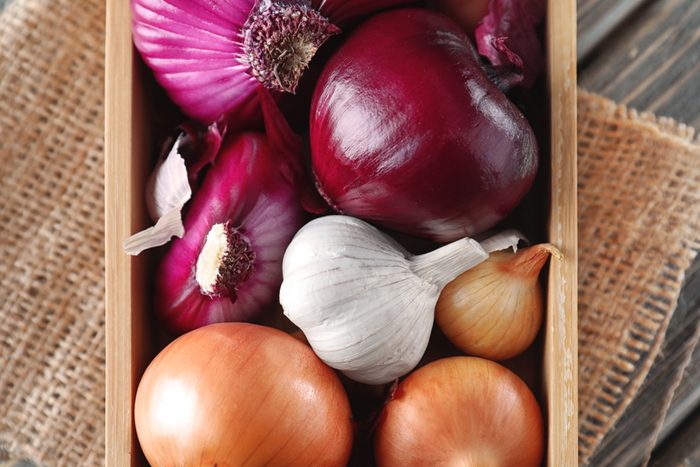
Cook with onion
Onions are also a great source of prebiotic fiber, and have additional benefits which may enhance your body’s ability to fight colds. “Onions may help to boost the immune system by increasing nitric oxide production in cells,” Palinski-Wade says. Nitric oxide is a chemical compound that’s involved in many different systems in the body—protecting your heart in addition to your immunity. But you have to ingest the onions to get the benefit—don’t fall prey to the old wives’ tale of placing cut onions around the room. Here are more immunity-boosting foods you need to fight off colds and flu.

Cut back on wine
According to the National Institutes of Health, drinking too much alcohol on a regular basis can suppress your immune system, making you more vulnerable to sickness. A study published in 2015 in the journal Alcohol shows that even one bout of binge-drinking can slow your body’s ability to ward off infections. Alcohol can affect your chances of getting sick in other ways, too. “Alcohol can impact your natural sleep cycle and cause interrupted sleep,” Palinski-Wade says. “When sleep is impaired, your immune response can weaken and risk of infection can also increase.” Find out more habits that might be ruining your immune system.
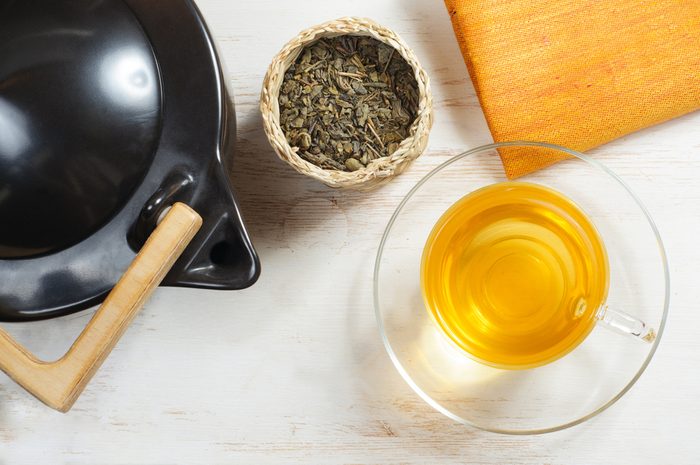
Go green
Try replacing that glass of wine with a comforting cup of green tea. A review of studies published in 2018 in the journal Molecules suggests that regularly drinking green tea may help guard against the flu and some cold symptoms. “Tea, especially green tea, is rich in antioxidants that can aid the immune system and protect against colds,” Palinski-Wade says. “The six main antioxidants in green tea have each been found to help block different phases of infection in cells from a virus, which may weaken the virus and reduce the risk for infection.” Not a tea drinker? “Hot beverages [in general] may offer benefits since the warm temperature can open nasal passages and promote healthy mucous function,” Palinski-Wade says. Read about more health benefits of green tea you haven’t heard before.
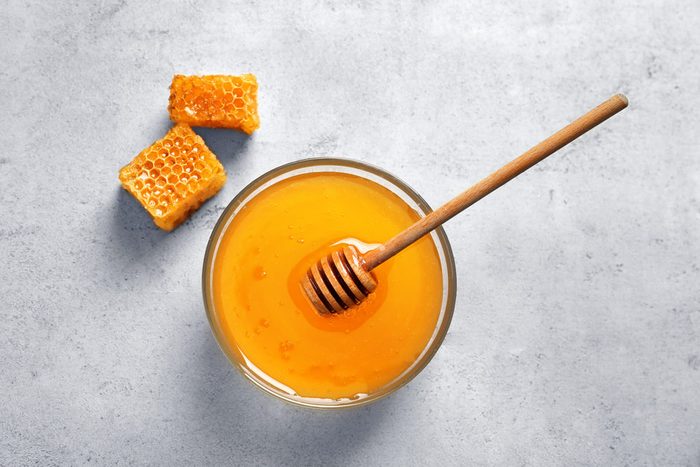
Take it with honey
You can make a soothing cup of tea potentially even more protective against cold symptoms by adding some honey. “Honey can act as a cough suppressant, and research has found honey may suppress coughs better than standard cough medicine while improving sleep,” Palinski-Wade says. Studies, including one published in 2015 in the journal Molecules, have found that honey has antibacterial properties, which won’t ward off the common cold (a virus) but can prevent strep throat. In addition, “honey can help to protect against complications that can arise from a cold, such as ear infections,” Palinski-Wade says. Just don’t give honey to children under age one because of the risk of infant botulism. Check out more natural remedies for cold and flu that really work.
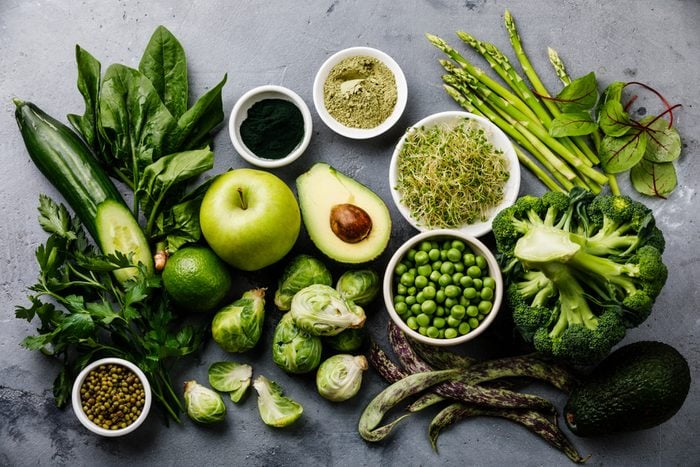
Eat your veggies
It’s no surprise that vegetables are good for you—and research, including a study published in 2015 in the journal Immunopathologia Persa, shows they can give your immune system a boost. “A diet rich in antioxidants can be protective during cold and flu season as it supports immune health,” says Palinski-Wade. “Since vegetables are rich in many antioxidants, including vitamin A and vitamin C, consuming a diet rich in vegetables may provide added protection against colds and flu.” A study published in 2016 in the journal Advances in Nutrition found that antioxidant plant compounds called flavonoids, found in brightly colored fruits and veggies, can reduce the risk for upper respiratory infections like sinusitis and the common cold. Read about more foods you should eat to prevent colds and flu.
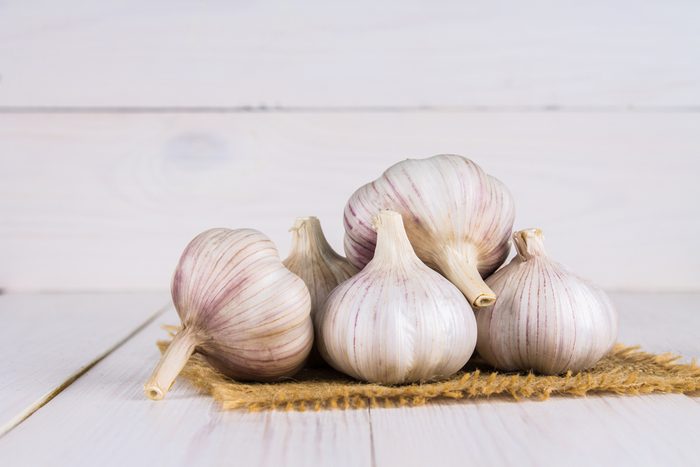
Get garlic breath
Make like you’re warding off vampires by embracing the benefits of garlic. “The compound allicin found in garlic helps to boost the immune system to fight against infection,” Palinski-Wade says. “Taking supplemental garlic has been found to reduce infection from colds, as well as reduce the duration of colds.” It may also prevent the common cold. (Talk to your doctor before starting a garlic supplement, though.) Find our more garlic benefits that will improve your life.

Nosh on protein
It’s important to get protein to keep your body strong against viral infections. “Protein is needed to build and repair body cells, including white blood cells which fight off infections,” Palinski-Wade says. “A diet deficient in protein may weaken the immune system.” But, don’t go overboard: Palinski-Wade says most people already consume more dietary protein than needed. If you’re a vegetarian or are looking to eat a more plant-based diet, check out these 9 sources of complete protein that aren’t meat.

Curl up with chicken soup
Could it be that the combination of hot liquid, vegetables, lean chicken, onion, and sometimes garlic creates the magical power of chicken soup? After all, the recipe seems to include just about all the recommended foods to boost the immune system and help stop a cold in its tracks. “Chicken soup can be very soothing to cold symptoms, as the hot fluid can open nasal passages and decrease mucus while also providing a boost of antioxidants and protein,” Palinski-Wade says. Learn more about the science-backed cold home remedy doctors love.

Skip the sugar
Added sugar isn’t good for your body in general, and it’s best to lay off sweets if you want to keep your immune system healthy. “A diet very high in added sugar may increase inflammation in the body, and as inflammation rises, so do stress hormones, which can begin to weaken the immune system,” Palinski-Wade says. “Aim for less than 10 percent of total calories coming from added sugars each day.” Find out more ways eating sugar is making you sick.

Avoid unhealthy food
A diet loaded with processed foods isn’t going to give your body the nutrition it needs to keep in peak condition—plus, it takes up space on your plate that would otherwise be filled with healthy, cold-fighting foods. “Although there aren’t specific foods that will increase your risk of catching a cold, eating a diet based on whole, unprocessed foods packed full of antioxidants, such as fresh fruits and vegetables, can protect you,” Palinski-Wade says. Read about more surprising ways your body responds to the common cold.

Stay hydrated
Downing enough liquids, whether hot or cold, is another good way to keep mucous membranes moist, says Dr. Ahn. In addition, “staying well hydrated can help flush toxins from the body,” Palinski-Wade says. Above all, you want to prevent dehydration, which can weaken your body’s defenses. A review of studies published in 2015 in Nutrition Reviews shows that dehydration is a risk factor for many health conditions. You don’t have to aim for a certain amount; just drink enough so that your pee is clear or at least pale yellow. Find out the sneaky ways you might be making yourself dehydrated.

But avoid the water fountain
Plan ahead and carry your own water bottle to prevent having to use a potentially germy public water fountain. If they are cleaned frequently, “drinking fountains with clean water are safe to drink from,” says Jennifer Lighter, MD, a pediatric infectious disease specialist at NYU Langone Health in New York. But according to one study, conducted by NSF International, school water fountains had more germs on them than toilet seats, indicating that regular cleaning may not be happening. “Transmission of germs may occur due to contamination of equipment on frequently touched surfaces,” Dr. Lighter says.

Wash your water bottle
Although carrying your own water bottle is advised to prevent the spread of germs, not cleaning it will defeat the purpose. “If you have a personal water bottle, make sure to clean it frequently, as they can be teeming with pathogens after several uses,” says Dr. Ahn. Also, avoid touching your hands to the spout of the water bottle to prevent cold germs on your hands from spreading to your bottle and then into your mouth. Find out more things doctors and nurses do to stop a cold in its tracks.

Label your glass
It can be tempting to take a swig from your friend’s water bottle if you’re thirsty, or try that tasty drink she ordered, but don’t do it. “One can certainly pass the cold virus to others via sharing glasses and utensils,” Dr. Ahn says. “Upper respiratory viruses are spread via respiratory secretions and mucus, not necessarily saliva; but if a person is coughing excessively, some of these secretions can end up in saliva and cause infection to others if exposed.” Ew! “The smart thing would be to avoid sharing drink containers and utensils whenever possible,” he says. “Labeling them would definitely help.” Set out a marker next to disposable cups at parties, or invest in fun wine charms for wine glasses. You can even use washable glass markers for regular glassware. How about other shareable items? For instance, is it really that bad to share a toothbrush with your partner? (In a word: yes!)
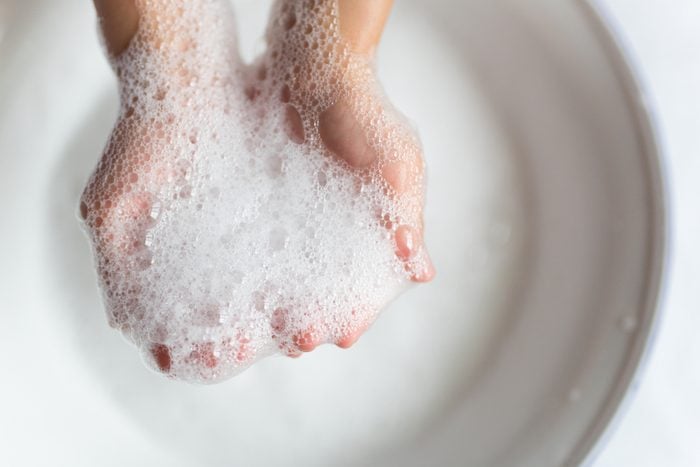
Teach your kids healthy habits
As any parent knows, kids are germ magnets, because they touch everything and are even more likely to touch their face than adults. Plus, their immune systems are still developing, so they have less resistance to colds. Put them in close quarters with other kids in school or daycare and it’s no wonder they catch six to 10 colds a year, on average. The best way to reduce that number? Teach them the same habits you use yourself. “Healthy habits include washing hands with soap and water or an alcohol-based sanitizer when entering school or home, [before eating], and after going to the bathroom,” Dr. Lighter says. “Additionally, when coughing or sneezing, doing it either in a tissue or the inside of the elbow.”

Keep germs from coming home from school
Give your kids all their own school supplies so they don’t have to share, and remind them not to share drinks, snacks, earbuds, or lip balm either. You can also provide your child’s classroom with cold-prevention supplies such as tissues, cleaning wipes, and hand sanitizer. Avoid any cold-causing germs your kids did pick up from school from entering your home—and infecting you—by starting a “decontamination” routine the second they walk in the door. “The most important step would be for children to wash their hands when entering the home,” Dr. Lighter says. Also, clean out their backpacks and wipe them down periodically. If they do get sick, here are cold remedies for kids all parents should know.
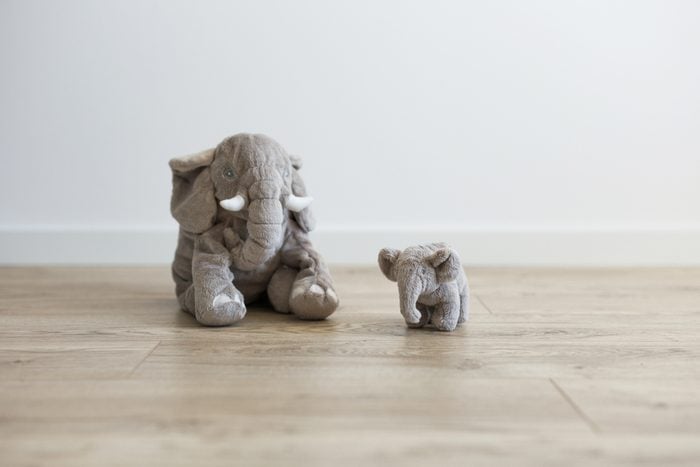
Wash toys
It’s not just your own kids you have to worry about: Anytime your kid’s friends comes over, they could be bringing germs with them that could then spread to you and your family. Wash toys after hosting playdates. But if they’re only used by your own child, don’t go nuts. “The frequency of cleaning toys depends on how frequently they are used and by how many people,” Dr. Lighter says. “As an infectious diseases physician, I don’t think my own children’s toys have ever been washed, as they are predominantly only used by my children. In my hospital, however, it is expected and audited that each toy played with gets cleaned after every use.” Likewise, if your child has played with another child’s toys (or worse, the toys in the doctor’s office waiting room), make sure they wash their hands afterward.

But let your kids build immunity
Don’t let your kids be too much of a clean freak. “Young children usually get a mild virus every three to four weeks, and that is OK,” Dr. Lighter says. “Germs help train the immune system of young children.” A study of Amish children who lived on small farms, published in 2016 in The New England Journal of Medicine, found significantly lower rates of asthma thanks to their environment, which was rich in microbes. If you allow your kids to build their immune response, they will likely be healthier.
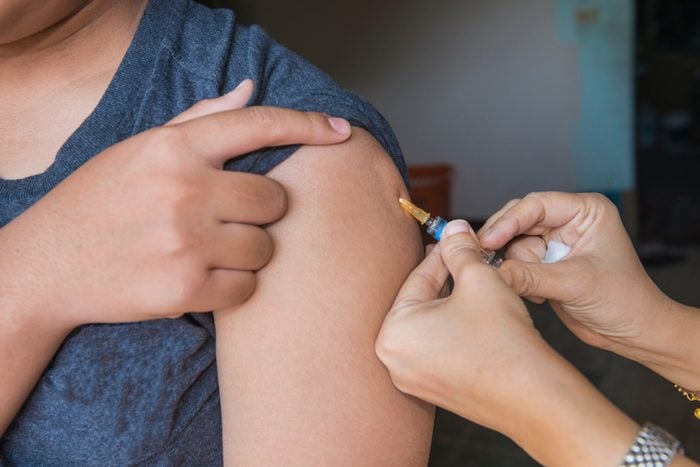
Get vaccinated
Although there is not yet a vaccine against the common cold, there is an immunization to protect against its cold-weather companion, the flu. Each year scientists create vaccines for the strains they think will be most common, so they’re not 100 percent—but they’re your best shot. “It is extremely important to protect oneself and all children against dangerous germs with vaccinations,” Dr. Lighter says. As well as keeping up to date with your child’s regular vaccine schedule, the CDC advises everyone over the age of six months to get a flu shot by the end of October. Here’s what else needs to be part of your flu-fighting kit this winter.
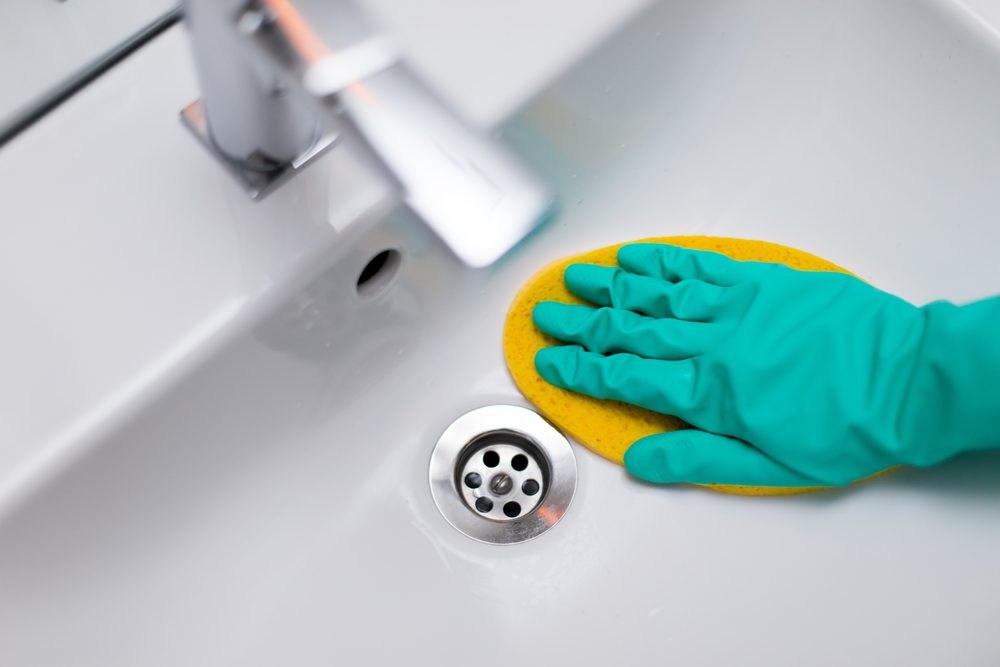
Wipe down your home and office
OK, we just said not to go too crazy with the cleaning, but you still probably should give a quick wipe-down to common surfaces in your home, classroom, or office on a regular basis, recommends the CDC. “Any surface which is frequently touched should be cleaned regularly to prevent the build-up of germs,” Dr. Lighter says. Cleaning doorknobs, light switches, handles, and anything that’s touched regularly by multiple people can help keep germs at bay. Read about more smart ways germ experts boost their immune system.

Consider taking zinc
Don’t rely solely on herbal medicine or vitamins to keep you healthy, as research isn’t super-solid. But, one you could try (with your doctor’s OK) is zinc, which plays a role in immune function, according to a review of studies published in 2017 in Journal of the Royal Society of Medicine. “Zinc may help to reduce the duration of the cold virus,” Palinski-Wade says. Find out more on how long a cold lasts.
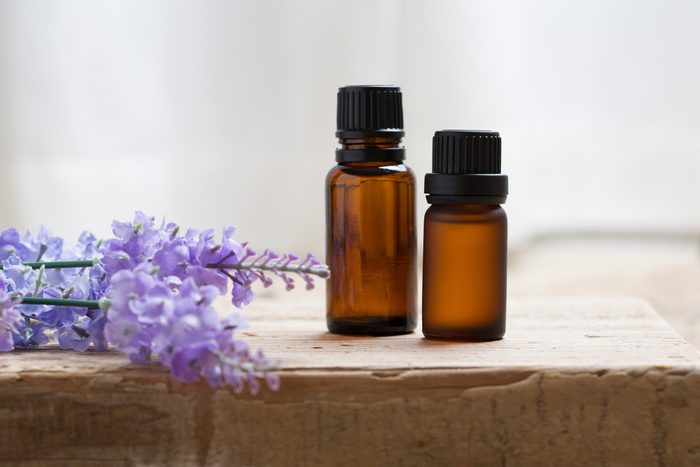
Try essential oils
Although scientific research is still emerging on these natural remedies, diffusing essential oils might actually help ward off sickness. “There is limited research on the efficacy of essential oils in preventing or treating the common cold; in general, they appear to be safe and anecdotally can help boost the immune system and perhaps help prevent developing a cold,” Dr. Ahn says. “For example, some essential oils like eucalyptus oil and tea tree oil have some natural anti-viral properties, and others like peppermint oil can be commonly used to help relieve congestion.” But, if there is any question on safety, Dr. Ahn recommends talking with your doctor before taking, “especially for people with underlying medical problems or ear, nose, or throat issues.” In addition, he notes that essential oils aren’t regulated by the FDA, and there are no standards for dosing or concentration. Here are 10 essential things to know about essential oils.

Ease your stress
You know that “rundown” feeling you get when you’re stressed out? It can actually make you sick, says Dr. Ahn. “Anything that stresses the body either physically or emotionally can weaken the immune system, making you more susceptible to infection,” he says. “The body’s response to constant stress decreases its ability to produce infection-fighting cells, which cumulatively can increase the likelihood of catching a simple cold, or in some cases even more serious infection.” Find out ways to make managing stress much easier.

Stay positive
Looking on the bright side of life can actually help ward off illness. “Having a positive outlook on things can play a strong role in preventing illness—although I wouldn’t use this as the only defensive measure,” Dr. Ahn says. “Plenty of rest, a healthy lifestyle, and aggressive hydration are still very important.”

See friends
One way to lower your stress level is to get together with friends on a regular basis since humans are social creatures. Socialization can help keep you healthy in general—and may even help prevent the common cold, according to a study published in 2015 in Psychoneuroendocrinology. “Stress-relieving activities like getting together with friends can help as well as more traditional methods of cold prevention,” Dr. Ahn says.

Hug it out
You’d think close contact would increase the likelihood of colds spreading, but a study published in 2014 in Psychological Science found the more people hugged others, the less chance they had of getting sick. This could be because, as mentioned above, people who have strong relationships tend to get sick less—plus, there could be a benefit in the actual physical contact.
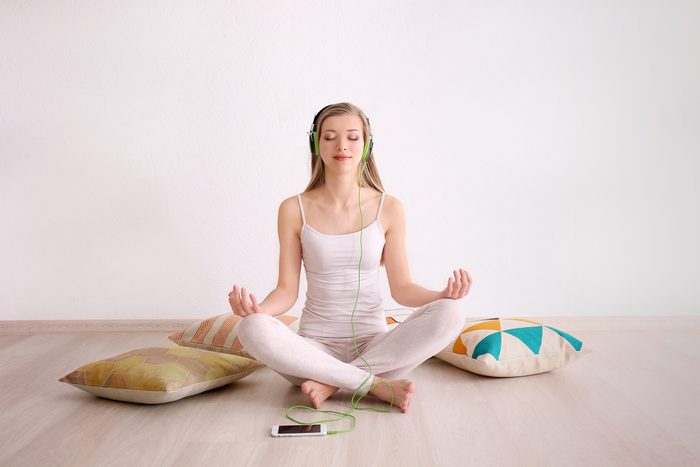
Meditate
Dr. Ahn also advocates meditation and relaxation techniques as additional ways to reduce stress in order to help prevent colds. A study published in 2018 in PLOS One backs up meditation’s usefulness not just in mental health but physical health, too. Researchers found that those who participated in eight weeks of mindfulness meditation training had lower rates of acute respiratory infections (ARI) compared to those who didn’t.

Quit smoking
As if you needed another reason to quit, smoking can make it more likely you’ll end up with a cold. “Smoking has been shown to weaken the immune system in multiple ways, such as damaging the body’s ability to naturally move germs away from the lungs and nose, as well as altering immune cells,” Dr. Zipkin says. It can also dry out your mucous membranes and make them more vulnerable to germs. But, “the negative effects on the body from smoking can be largely reversed by quitting,” he says. Here are more mind-blowing ways your body heals after you quit smoking.

Bug your boss
Not with a cold bug, but with gentle nudging to review your company’s sick policy. One 2015 survey found 62 percent of American employees have shown up to work sick. Another found that only 16 percent of workers used all of their sick time, with 32 percent not using any at all. Paid sick time should be given to workers, and workplace culture should encourage employees to stay home or work from home when sick, or even asked to leave if they show up with visible signs of illness. This benefits the company too: It’s better to have one employee absent than several employees who caught her germs. Try these rules for how to call in sick for work.
